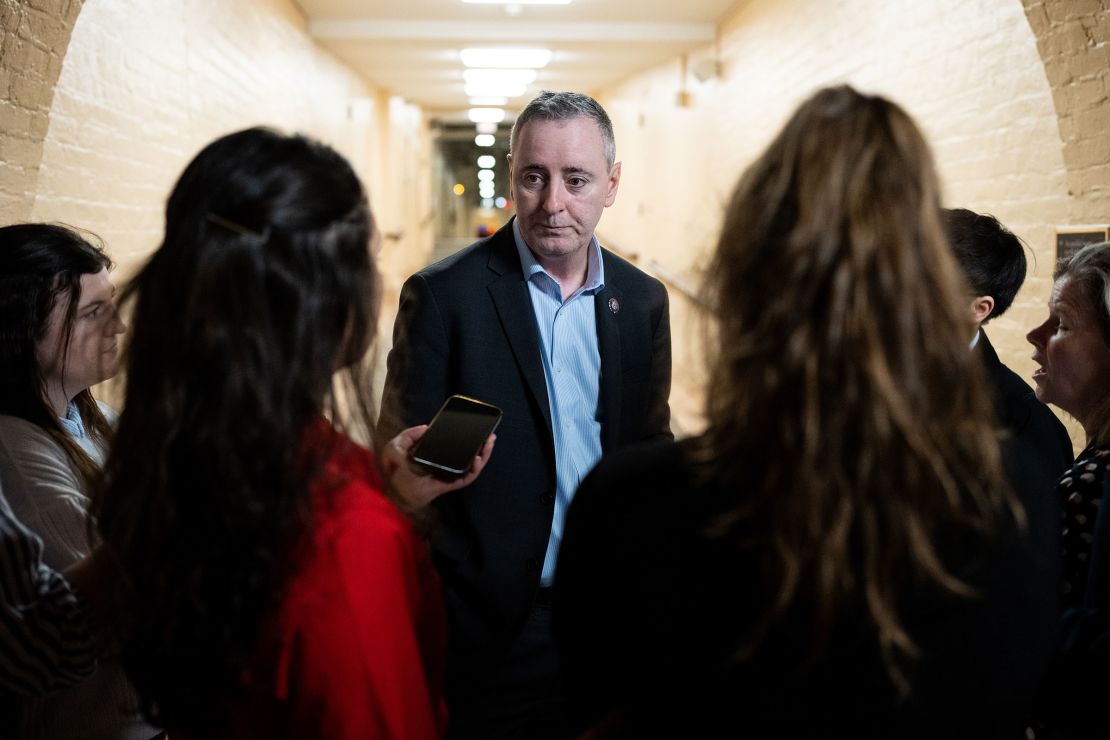Watch CNN’s coverage of how Speaker Mike Johnson is handling aid to Ukraine on “Inside Politics Sunday with Manu Raju” at 11 a.m. ET.
Speaker Mike Johnson swiftly derailed the Senate’s bipartisan aid package for Ukraine, but he’s left the door open to a new proposal emerging in the House.
Behind the scenes, Johnson has met privately with House Republicans who have been trying to build support for a new bipartisan foreign aid package that includes restrictions on the US border with Mexico. And now House Foreign Affairs Chairman Michael McCaul is taking a lead role in trying to finalize a proposal and build consensus within the conference as part of a push for floor action by late March or April.
Johnson has not yet taken a position on the plan or committed to giving it a floor vote, telling his colleagues that they need to finalize government funding legislation first. But once that process is done by mid-March, Republican backers of the plan believe he will let it come to the floor – even it risks backlash from hard-right members or even a vote for his ouster from the speakership.
“More than you think,” Pennsylvania Rep. Brian Fitzpatrick, a leader of the effort, said bluntly when asked about the support the GOP leadership team has given his bipartisan proposal. “We have to get something done.”
Still, getting legislation through the House remains an extremely tall order. Republicans are badly divided over Ukraine, and former President Donald Trump could effectively kill the bill with one social media post. Plus, ample Democratic support would be needed to pass it – a tall order given that the package includes new border restrictions and aid to Israel that would likely prompt a revolt on the left.
With Russia making gains in Ukraine, proponents say action is needed immediately. Fitzpatrick plans to begin a process this week to circumvent leadership and force a vote – known in the Capitol as a discharge petition, which would require support from a majority of House members to succeed. But even organizers of that effort recognize that it amounts to a long-shot bid and consider it a last resort. Their best bet: convincing Johnson to put the bill on the floor once it’s ready for action.
“I think, first, the speaker wants to get through the normal appropriations process, which is not easy,” McCaul said. “And then after that is done, then we tackle the supplemental. We are currently working on a draft. I think you’ll see a House imprimatur on this supplemental.”
McCaul, who briefed Republicans in the speaker’s office last week on the emerging plan, told CNN that Johnson has been “very deliberate.”
Other proponents of the measure say Johnson has clearly been open to their plan.
“No, I don’t think he’s trying to kill it,” said Rep. Mike Lawler, a freshman New York Republican who has signed on to the effort. “I think he understands the need to get support for Israel, for Ukraine, for Taiwan. … It’s a function of process and working through these issues within the conference.”
Lawler added: “Any threat to use the motion to vacate (the speaker) is idiotic. We need to be focused on solving the problems.”

Warnings on the right
Johnson has faced pressure on all sides. He has endured criticism internationally and from Democrats who say his failure to act immediately amounts to siding with Vladimir Putin. Senate GOP Leader Mitch McConnell has pressed him to allow a House vote on the Senate’s $95 billion aid package for Ukraine, Israel and Taiwan, warning that any House changes to that plan would simply delay action and make it harder for Ukraine to defeat Russia.
Yet Johnson’s right flank has pointedly warned him not to approve a dime more of funding for Ukraine.
“That would be a huge mistake,” said Rep. Marjorie Taylor Greene, a Georgia Republican and staunch opponent of Ukraine aid. “The American people don’t support it, and our job title is representative. Our job title is not fund the CIA’s war against Ukraine. That’s not what we’re elected to do.”
Rep. Bob Good of Virginia, the leader of the House Freedom Caucus and one of the eight Republicans who voted to oust Kevin McCarthy as speaker last fall, would not say whether moving on Ukraine aid would cost Johnson his job. But he said that any aid package must be offset with spending cuts and should not be tied with Israel – a much different approach from the one Fitzpatrick and McCaul are taking.
“Ukraine divides the Republican conference,” Good said. “I don’t think it has majority support. … So if it doesn’t have Republican majority support, it should not be brought.”
The effort to approve more aid to Ukraine has been delayed for months amid GOP infighting. First, Republicans demanded Congress move on tougher border security measures before advancing aid to Ukraine. Then, after a bipartisan border security deal was cut after nearly five months of talks in the Senate, Johnson – along with Trump – immediately declared it too weak, effectively killing the effort.
After the Senate dropped the border deal amid Johnson’s opposition and then approved the $95 billion aid package last month, McConnell said the House GOP could no longer wait to act.
“If they change it and send it back here, we have further delay,” the Kentucky Republican told reporters last week. “Not only do we not want to shut the government down, we don’t want the Russians to win in Ukraine. And so we have a time problem here. And the best way to move quickly and get the bill to the president would be for the House to take up the Senate bill and pass it.”
Johnson has said he won’t take up the Senate plan because it’s silent on the border. But on Thursday, he suggested that he’s willing to consider measures being developed in the House.
“The House is actively considering options on a path forward,” Johnson said. “And so, we’re getting government funding done, and then we’re going to turn to these other priorities.”

Ukraine backers make their move
The foreign aid plan being developed by the bipartisan group of members would provide $66 billion in military aid to Ukraine, Israel and Taiwan – removing humanitarian aid that was a part of the Senate package and a priority of many Democrats.
Moreover, it would deny the entry of undocumented immigrants into the US until operational control of the border is achieved, while sending migrants to Mexico or their country of origin as they await adjudication of their claims in the United States – a policy known as “remain in Mexico.”
McCaul told CNN the group was looking at other changes to the bill as well, including seizing frozen Russian assets in the US and transferring those to Ukraine – a proposal known as the REPO Act. And he said the members were considering turning some of the aid into a US loan – an idea floated by Trump.
Asked whether he would sign onto a discharge petition to force a vote, McCaul signaled he was leery.
“That would be a last resort, and it wouldn’t sit well with a lot of Republicans,” McCaul said. “That usurps the speaker’s power.”
But the proposal is bound to be a hard sell with many Democrats, who are opposed to the immigration restrictions as well as the lack of humanitarian aid. And a number of progressives want to place conditions on aid to Israel amid the humanitarian crisis in Gaza, an idea flatly rejected by Republicans.
While Fitzpatrick said he was open to adding humanitarian aid, he acknowledged that making too many changes could upset their bipartisan compromise.
“Well, it’s like a water balloon – every change you make, you’re going to add or lose votes,” Fitzpatrick said. “And that’s why we’re trying to find that point of equilibrium, that sweet spot that we can get to 218 votes.”
Some critics of Ukraine aid said they wouldn’t be surprised if they ultimately get rolled.
Rep. Chip Roy, a Freedom Caucus member, said Johnson shouldn’t endorse the bipartisan plan.
“I don’t think he will,” the Texas Republican told CNN. “But I know that there’s obviously an interest to try to move forward on some of that. … I’m going to be blunt. The defense hawks usually get their way. And that’s just the way this town works.”
CNN’s Melanie Zanona, Lauren Fox, Sam Fossum and Morgan Rimmer contributed to this report.

